




Explore David Lynch’s very first rumblings of creativity all the way to the wondrous early years as a filmmaker. Filmed over a four year period and funded via Kickstarter, David Lynch: The Art Life opens up the method and process of Lynch’s artistic works, and offers a portrait of Lynch as someone who was, and still is, deeply alert to the possibilities of living the creative life.
The doc is meditative in its approach. Mostly we see Lynch working quietly in his Hollywood Hills studio wearing his loose professorial slacks and button-up shirt, applying paints, fixing up models and twisting wire that will be incorporated into the finished products. On occasion we see old photos and 8mm footage of a young Lynch larking around with his family and friends. Over the top of all this, Lynch narrates and reminisces on a childhood spent moving from one city to another. Although his family was uprooted many times due to his father’s work as a research scientist, Lynch describes his childhood in idyllic terms. Sunny days spent making wooden guns and playing cowboys.
He then talks of his introduction to art and artistic practice through friends and colleagues, and the prolific production of paintings he endured before he began to find his artistic mojo. He then laments over his experiences of attending the School of the Museum of Fine Arts in Boston, Massachusetts and Pennsylvania Academy of the Fine Arts in Philadelphia during his late teens and early 20s. Experiences that were equally frustrating and exhilarating. The evolution of Lynch’s work is vivid. He breaches abstract painting to moving images quickly, spurred on by wishing to see his own artwork adopt movement and sound. His move to Los Angeles and his acceptance into the American Film Institute Conservatory were the turning point in Lynch’s artistry. His live action abstract films, The Alphabet (1968) and The Grandmother (1970) sent Lynch on the road to becoming the filmmaker he is today.

Throughout the film, Lynch recalls fragments of his early life that have inevitably bled into his artistic work. Perhaps most effectively, he recalls the moment a naked middle-aged woman walked across her lawn, bloodied and crying, while Lynch played with his younger brother in their sweet suburban neighbourhood . In the story he tells, the young Lynch wants to help the woman, but he’s too juvenile to understand the crisis, whilst his younger brother just begins to sob at the sight.The juxtaposition of childhood innocence and the viciousness of the adult world is something Lynch would apply and explore in his film work. In fact, this scene would play out later in Blue Velvet (1986), when the mysterious Dorothy Valens (Isabella Rossilini) stumbles naked and bruised across the suburban lawn. This is just one example from Lynch of life bleeding into art and vice versa.
The film is also gorgeously shot and edited. Frames of a quiet, thoughtful, and aging Lynch sipping a coffee and surrounded by clouds of cigarette smoke illuminated by sunlight are mesmerising to watch. During these moments of reflection, the layers of Lynch begin peel back to reveal something very human and even fragile – something that is mostly absent in his public persona as an avant-garde filmmaker. No other voice is included in the film, only Lynch tells his story and every frame either has him in it or has a product of his artistic work.
The movie concludes just as Lynch is working on his debut film, Eraserhead (1977), a production period that would last over half a decade and see Lynch experience early fatherhood and divorce from his wife Peggy. Whilst personal triumph and trauma is left off the agenda, this period of time in Lynch’s life is transitional in terms of his art and his foray into filmmaking. Eraserhead could be seen as the accumulation of artistic knowledge that Lynch garnered during his formative years laid bare. It’s clear that Lynch recalls Eraserhead and indeed the time of its production as the purest embodiment of his art.

The freedom that he was allowed to craft his film during this time would rarely be replicated in future film productions as he began to be embraced by Hollywood and be responsible for million dollar budgets and the production of a commercial commodity. Lynch experienced barely any interference at all from AFI profs and certainly no studio executives were knocking on his door. This allowed Lynch to strive, to fail and ultimately to learn the language of film and incorporate his artistic background without dilution. Though it’s not as if Lynch has made many compromises since becoming a filmmaker. His directorial work Eraserhead has remained daring, abstract, strident, frightening, and life-affirming, and it is to his credit that Lynch can produce abstract fever dreams that play in movie theatres and are syndicated for television.
Those disappointed that the documentary concludes just as the directorial work begins, and films such as Blue Velvet, Twin Peaks (1992), and Mullholland Drive (2001) are left unexplored and in fact go unmentioned, should take comfort in that the film endeavours to explore and connect the process of the early art works with the contemporary works in cinema. It connects the younger impressionable Lynch with his older, wiser self. It could be said that in Lynch’s world the methods of creativity and artistic integrity can be applied to the any medium. Be it painting, sculpture, musical composition or film, the places where they come from, the memories and experiences gained in life, are one and the same.
David Lynch: The Art Life provides an unflinching and in-depth portrait of a fascinating artist whose life and art have merged to create something truly unique. The film is out in selected UK cinemas on July 14th, 2017.
This is not the only recent documentary dealing with the legendary filmmaker: click here for our review of Peter Braatz’s Blue Velvet Revisited (2016).
















